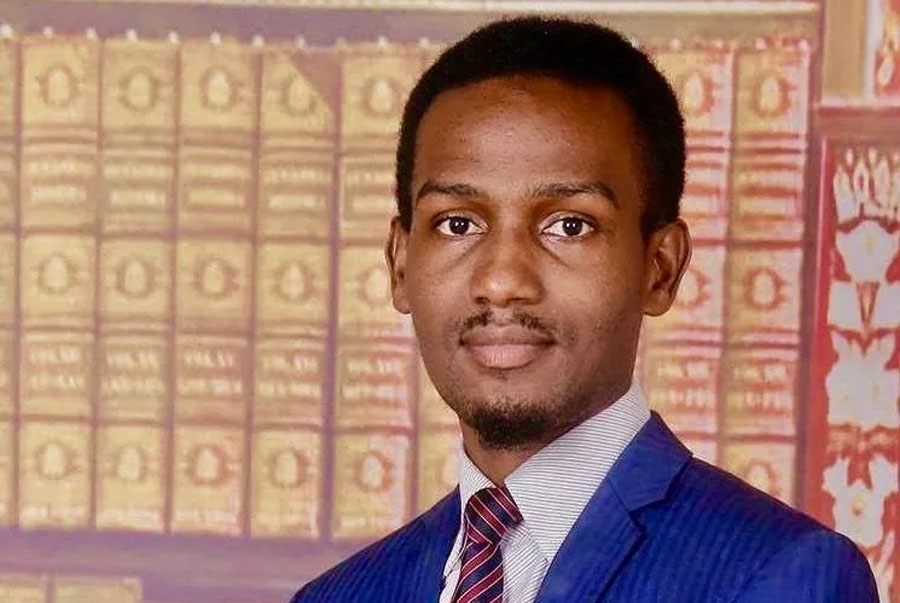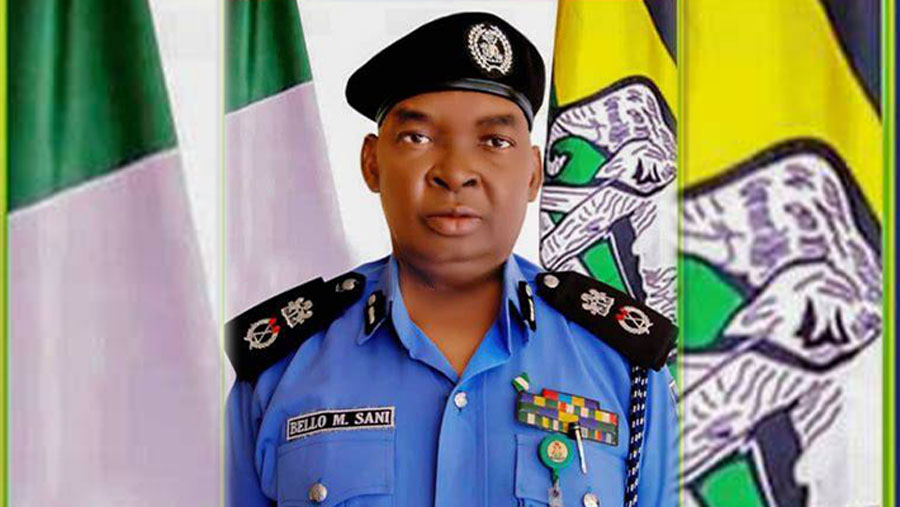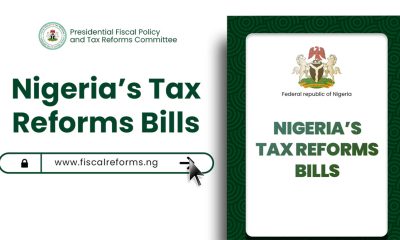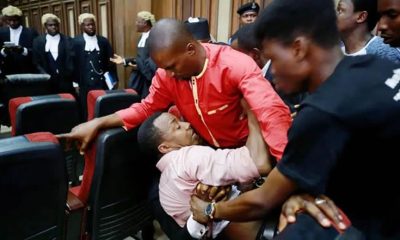metro
2023: Court okays suit seeking Tinubu’s trial over alleged perjury

The Federal High Court sitting in Abuja yesterday fixed November 1 to commence hearing on a suit seeking to compel the Inspector General of Police, IGP, Usman Baba, to initiate a perjury case against the presidential candidate of the ruling All Progressives Congress, APC, Senator Bola Ahmed Tinubu.
The court, in a ruling delivered by Justice Inyang Ekwo, granted permission to the Incorporated Trustees of Center for Reform and Public Advocacy, a Civil Society Organization, CSO, to apply for an order of mandamus to compel the IGP to, in line with Sections 31 and 32 of the Police Act and Section 3 of the Criminal Justice Act, 2015, prefer charges against the APC flag-bearer, following an allegation that he lied on oath.
Justice Ekwo held that an ex-parte application the group brought before the court on Thursday was meritorious.
He, therefore, ordered service of all the relevant processes in the substantive suit marked: FHC/ABJ/CS/1058/2022, on the Nigerian Police Force, NPF, and the IGP, who were cited as 1st and 2nd Respondents, respectively.
READ ALSO:
- JAMB approves cut-off marks for varsities, polytechnics
- 100 million poor Nigerians make up my political structure, says Peter Obi
- Ondo police arrest woman during stolen baby’s christening
The group had through its team of lawyers, led by Mr. Ugo Nwofor, told the court that the suit was necessitated by the IGP’s refusal to take action on its petition against the APC’s presidential candidate over an offence it said was established by report of an investigation conducted by Lagos State House of Assembly in 1999.
The group told the court that it had earlier forwarded a petition to Police authorities, demanding further action on the said investigative report.
It maintained that by virtue of Sections 214 and 215, of the 1999 Constitution, as amended, as well as Section 4 of the Nigerian Police Act, 2020, the Police have the statutory responsibility to “prevent, detect and investigate criminal allegations, whether brought to their notice by individuals, person or persons, corporate bodies, institutions etc”.
It further claimed that by Section 31 of the Nigerian Police Act, the Respondents, are duty bound to investigate alleged crime brought to them and report their findings to the Attorney General of the Federation or of a state, as the case may be, for legal advice.
The Applicant added that by Section 32(1) of the Police Act, “a suspect or Defendant alleged or charged with committing offence established by an Act of the National Assembly or under any other laws shall be arrested, investigated and tried or dealt with according to the provisions of this Act, except otherwise provided under this Act”.
compelling the Respondents to comply with Sections 31 and 32 of the Police Act and Section 3 of the Criminal Justice Act, 2015 in respect of alleged crime laid out in complaint of the Applicant encapsulated in the letter of June 16, 2022, received by the Respondents on the same date and titled: Demand for Criminal Prosecution of Senator Bola Ahmed Tinubu under Sections 191,192 and 463 of the Criminal Code Act, Law of the Federation of Nigeria, 2004 Consequent upon the Findings of the Lagos State House of Assembly Ad-hoc Committee, 1999.”
VANGUARD
metro
Reno Omokri Alleges El-Rufai, Sons Linked to Dadiyata’s Disappearance

Reno Omokri Alleges El-Rufai, Sons Linked to Dadiyata’s Disappearance
Former presidential aide and political commentator Reno Omokri has renewed allegations implicating former Nasir El-Rufa’i and his sons in the disappearance of activist Abubakar Idris, popularly known as Dadiyata, who has been missing since August 2, 2019, in Kaduna.
In a post on X (formerly Twitter), Omokri claimed that statements and social media posts by El-Rufa’i and his sons suggest they “have a strong case to answer” over Dadiyata’s abduction. Omokri cited a remark allegedly made by El-Rufa’i in 2019:
“Anybody that tries to criminalise Nasir El-Rufa’i should know that he has a battle on his hands till one of us drops dead.”
Omokri noted that Dadiyata had repeatedly criticised the former governor and alleged corruption and abuse of power in Kaduna State. He argued that the remark, combined with later statements by El-Rufa’i’s son, Bashir El-Rufa’i, indicated a potential link to the activist’s disappearance. Omokri cited a December 23, 2019, statement by Bashir warning that:
“Dangerous lies in the public space have consequences,”
referring to the trending hashtag #WhereIsDadiyata.
READ ALSO:
- UK-Based Nigerian Gets 13-Year Jail Term for Forcing Girlfriend to Abort Pregnancy
- Lawmaker Jailed for Mocking President in Facebook Post
- Police to Arrest TikToker Mirabel After She Recants False Rape Claim
Omokri also highlighted a post allegedly made by Bashir in August 2025, in which he threatened to “unalive” a social media user and their family, saying it would be “easier than you think” to locate them — a comment Omokri suggested implied access to tracking or surveillance.
Another son, Bello El-Rufa’i, was mentioned in Omokri’s post for allegedly sending threats to the Speaker of the Kaduna State House of Assembly, Honourable Yusuf Liman, during a probe into claims that ₦432 billion went missing from the state coffers. Omokri further cited a 2020 private message allegedly sent by Bello containing threats of sexual violence against women of Igbo descent.
Describing these statements as evidence of “death threats” and “bloodlust”, Omokri concluded that there is sufficient reason to question Nasir El-Rufa’i and his sons over Dadiyata’s disappearance. He also praised Dadiyata as “young, intelligent, handsome and fearless,” while referring to the El-Rufa’i family as “fiendish.”
As of February 2026, no formal charges have been filed against El-Rufa’i or his sons. Nigeria’s Department of State Services has reportedly reopened investigations into the case, and public pressure continues for accountability and justice in the long-running mystery.
Reno Omokri Alleges El-Rufai, Sons Linked to Dadiyata’s Disappearance
metro
Again, Early Morning Blaze Destroys Dozens of Shops in Kano Market

Again, Early Morning Blaze Destroys Dozens of Shops in Kano Market
A devastating fire outbreak on Friday, February 20, 2026, razed at least 50 shops at the Fatima Simra Multi‑Purpose Market in the Dakata area of Kano State, leaving traders and residents in shock. The early morning blaze, which began around 5:40 a.m., rapidly spread across the market, affecting mainly small-scale enterprises involved in oil production, plastic recycling, and nylon processing.
The chairman of the market fire committee, Dauda Haruna Chula, confirmed the incident, noting that the Kano State Fire Service had been alerted and was en route to the scene. “From the preliminary assessment, about 50 shops are already down, and the fire is still ongoing. We did as much as we could to inform the authorities, and I can hear the sound of their fire trucks arriving now,” Chula said.
Traders expressed frustration over what they described as a slow emergency response, which allowed the fire to spread more rapidly. Many are now counting losses and making plans to salvage remaining goods, while others fear losing their entire livelihoods.
READ ALSO:
- Suspected Terrorists Warn Kebbi Residents: Pay ₦100 Million or Face Attack
- ICPC Searches El-Rufai’s Abuja Home Amid Multi-Agency Corruption Investigation
- Nigerian Navy Chief of Operations Dies in Egypt
This latest blaze comes less than a week after a major fire devastated Singer Market in Kano, displacing over 1,000 traders and destroying goods worth billions of naira. Following that disaster, the Federal Government and the APC Governors’ Forum pledged financial support to assist affected traders, highlighting the need for improved fire safety measures in commercial hubs across the state.
Authorities are continuing firefighting operations and have assured traders that investigations are ongoing to determine the cause of the fire, which preliminary reports suggest may have been triggered by electrical faults or unattended cooking equipment. Officials have emphasized the importance of emergency preparedness, fire prevention, and rapid response systems to prevent similar incidents in the future.
Kano State has a history of recurring market fires, raising calls from experts, trade associations, and residents for stricter safety regulations, including proper spacing of stalls, installation of fire hydrants, and training for traders on emergency response.
Again, Early Morning Blaze Destroys Dozens of Shops in Kano Market
metro
Suspected Terrorists Warn Kebbi Residents: Pay ₦100 Million or Face Attack

Suspected Terrorists Warn Kebbi Residents: Pay ₦100 Million or Face Attack
Fresh tension has gripped Utono community in Ngaski Local Government Area, Kebbi State, after suspected terrorists issued a letter demanding ₦100 million from residents and threatening a deadly attack if the ransom is not paid. The development has sparked fear across the community, highlighting the growing insecurity in northwest Nigeria, where armed groups continue to target rural settlements for ransom and other criminal activities.
According to local sources, the threat letter was delivered to community leaders on Thursday, February 17, 2026, warning residents not to dismiss the message. “This is not a joke. We are coming to preach. You must pay us ₦100 million. If you refuse, you will face the consequences and have no one to blame but yourselves. Even if you call soldiers, they cannot stop us,” the letter reportedly read.
READ ALSO:
- ICPC Searches El-Rufai’s Abuja Home Amid Multi-Agency Corruption Investigation
- Nigerian Navy Chief of Operations Dies in Egypt
- Tinubu, German Chancellor Merz Pledge Stronger Nigeria-Germany Ties
The group referenced a previous attack on Woro community in Kiama Local Government Area, Kwara State, where several people were killed after residents ignored a similar threat. The reference has amplified panic among Utono residents, many of whom are now developing safety plans and considering temporary evacuation.
A community source, speaking on condition of anonymity due to safety concerns, said the fear is widespread. “People are scared. The mention of what happened in Woro has made the threat more frightening. Many families are already discussing safety plans in case anything happens,” the source said.
Confirming the threat, Kebbi State Governor’s Chief Press Secretary, Alhaji Ahmed Idris, stated that security personnel have been deployed to Utono, including air surveillance units, to prevent any potential attack. “The government is not taking the threat lightly,” he added, emphasizing that residents’ safety remains a top priority.
Authorities have assured that intensified operations are ongoing to prevent incursions, protect residents, and deter further attacks. Security analysts warn that paying ransom may encourage more violence, urging communities to remain vigilant and cooperate with law enforcement and military agencies.
The Utono threat is the latest in a series of attacks across northwestern Nigeria, where terrorists and armed gangs frequently target remote communities for extortion, kidnappings, and other criminal acts, underscoring the urgent need for intelligence-led operations and government intervention.
Suspected Terrorists Warn Kebbi Residents: Pay ₦100 Million or Face Attack
-

 News3 days ago
News3 days agoSaudi Arabia Confirms Sighting of Ramadan Crescent, Fasting Begins Wednesday
-

 metro3 days ago
metro3 days agoLagos Woman Shares Ordeal After Alleged Rape, Sparks Nationwide Outcry
-

 News3 days ago
News3 days agoRamadan Begins in Nigeria as Sultan Confirms Crescent Sighting
-

 International1 day ago
International1 day agoCanada Opens New Express Entry Draw for Nigerian Workers, Others
-

 metro3 days ago
metro3 days agoSeven Killed in Horrific Crash at Ota Toll Gate
-

 News2 days ago
News2 days agoKorope Drivers Shut Down Lekki–Epe Expressway Over Lagos Ban (Video)
-

 Health2 days ago
Health2 days agoRamadan Health Tips: Six Ways to Stay Hydrated While Fasting
-

 Entertainment2 days ago
Entertainment2 days agoActress Destiny Etiko Breaks Silence on Alleged Nollywood Betrayal















